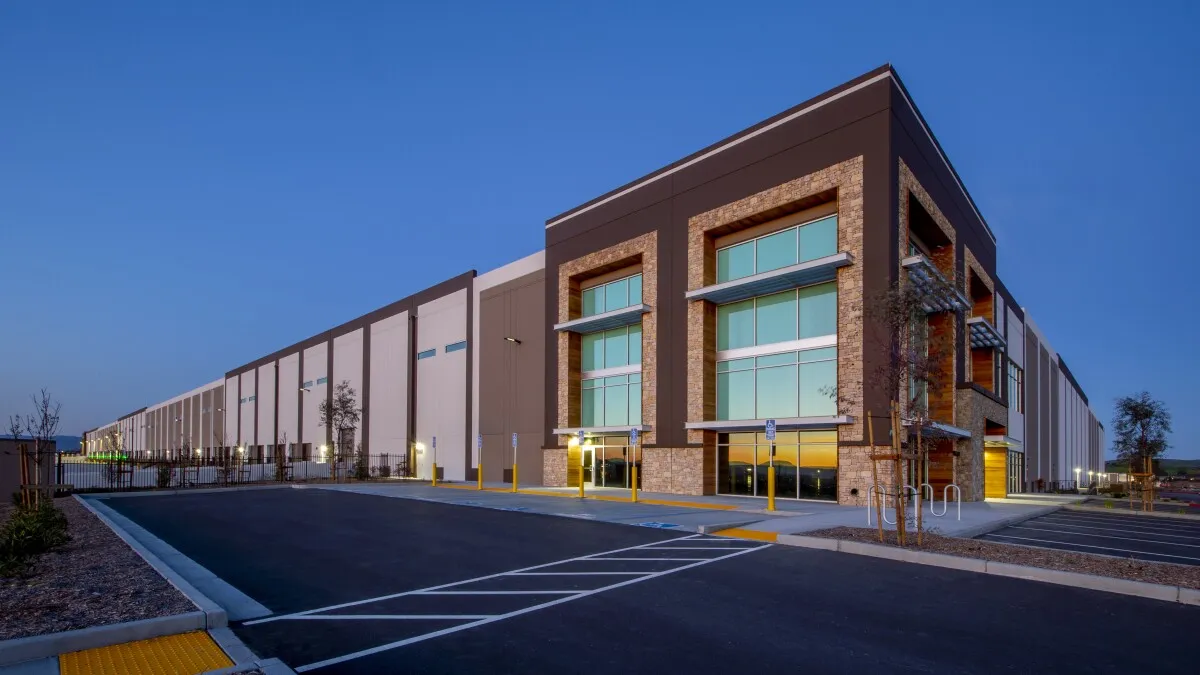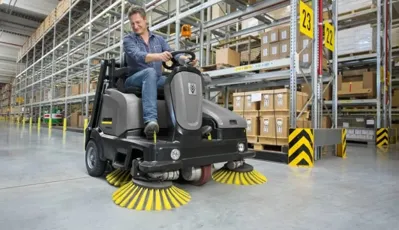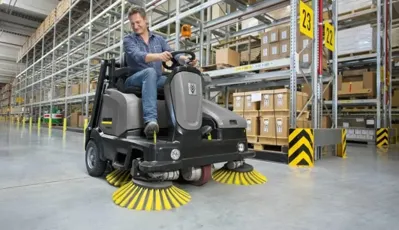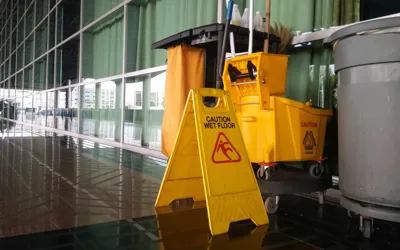The Essential Role of Warehouse Cleaners: Maintaining Safety, Efficiency, and Cleanliness
Warehouse environments are critical hubs for businesses, often serving as the backbone of distribution and inventory management. However, amid the constant movement of goods and machinery, cleanliness can sometimes be overlooked. Warehouse cleaners play a vital role in ensuring that these environments remain safe, organized, and efficient. Their work extends far beyond simple tidying up—it’s an essential part of maintaining workplace safety, productivity, and long-term operational success.

Why Warehouse Cleaners Are So Important
Warehouses can be messy places. Between the movement of large equipment, shipping and receiving of goods, and the wear-and-tear of constant foot traffic, cleanliness is easily compromised. Dirt, dust, and spills are commonplace, and without regular cleaning, these can lead to a variety of hazards, including:
· Slips, trips, and falls: Spills and scattered debris pose significant risks to workers.
· Contamination: Unclean surfaces can contribute to product contamination, especially in industries like food and pharmaceuticals.
· Fire hazards: Dust and clutter can easily become fire hazards, especially if flammable materials are present.
· Poor air quality: The accumulation of dust and dirt can decrease air quality, leading to respiratory issues for employees.
Key Responsibilities of Warehouse Cleaners
Warehouse cleaners are tasked with ensuring that these hazards are minimized. Their duties are often diverse and can vary depending on the specific needs of the warehouse, but key responsibilities generally include:
1. General Cleaning and Maintenance
· Sweeping and mopping floors to remove debris, dust, and stains.
· Cleaning high-traffic areas, including loading docks and aisleways, to ensure safe and smooth operations.
· Cleaning and disinfecting restrooms and break rooms to promote hygiene for workers.
2. Sanitization
· In warehouses handling food, pharmaceuticals, or other sensitive products, deep cleaning and sanitizing surfaces, storage shelves, and machinery is crucial to meet regulatory standards.
3. Waste Management
· Properly disposing of waste and recycling materials like cardboard, plastic, and packaging waste.
· Ensuring that hazardous waste is handled in accordance with safety regulations to avoid contamination or environmental damage.
4. Equipment Cleaning and Maintenance
· Cleaning and maintaining warehouse machinery and equipment such as forklifts, conveyors, and pallet jacks to ensure they remain functional and free from dirt and grime that could affect performance.
5. Air Quality Control
· Regularly cleaning HVAC systems, air vents, and filters to help maintain air quality and reduce the amount of dust circulating within the warehouse.
Skills and Qualities of an Effective Warehouse Cleaner
Warehouse cleaners must possess specific skills and attributes to carry out their duties effectively. Some of the key qualities include:
· Attention to Detail: Warehouse cleaners must have a keen eye for spotting areas that need attention and ensure that no corners are cut when it comes to cleanliness and safety.
· Physical Stamina: Cleaning a large warehouse requires physical endurance and the ability to perform tasks like lifting, sweeping, and bending over for extended periods.
· Knowledge of Safety Standards: Cleaners must be familiar with health and safety protocols, including the proper handling of cleaning chemicals and waste materials, to ensure they don’t contribute to unsafe working conditions.
· Time Management: Warehouses are often busy, and cleaners need to work efficiently and quickly, without compromising quality, so that operations continue without disruption.
The Impact of a Clean Warehouse on Productivity
A clean warehouse is not only safer but also more efficient. When clutter is minimized, there’s less risk of accidents or product damage, and workers can move more freely, improving the overall workflow. Employees working in a clean and organized environment are likely to be more motivated, productive, and focused, as a clean workspace has been shown to boost morale and reduce stress.
Moreover, a warehouse that is consistently clean is often more attractive to potential clients and customers, as it indicates a well-managed operation. For industries with high hygiene standards—such as food or pharmaceuticals—cleanliness is also essential for compliance with regulations, ensuring the safety and quality of the products being handled.
The Role of Technology in Warehouse Cleaning
Technology is increasingly playing a role in warehouse cleaning. Robotic floor scrubbers, automated waste collection systems, and even drones for inspecting hard-to-reach places are becoming more common in large warehouses. These technological advancements can improve cleaning efficiency and ensure that warehouse environments are kept in optimal condition with minimal human intervention.
Conclusion
The role of warehouse cleaners is indispensable in maintaining a safe, efficient, and productive environment. Their work ensures that the warehouse remains compliant with safety regulations, reduces the risk of accidents, and fosters a clean, organized space for employees to work. As warehouses grow in size and complexity, the role of cleaners will continue to evolve, with the help of advanced cleaning technologies to keep operations running smoothly. Whether through manual labor or the aid of automation, warehouse cleaners are a critical part of the supply chain ecosystem.
Featured Articles
 The Essential Role of Warehouse Cleaners: Maintaining Safety, Efficiency, and CleanlinessWarehouse environments are critical hubs for businesses, often serving as the backbone of distribution and inventory management. However, amid the constant movement of goods and machinery, cleanliness can sometimes be overlooked. Warehouse cleaners play a vital role in ensuring that these environments remain safe, organized, and efficient. Their work extends far beyond simple tidying up—it’s an essential part of maintaining workplace safety, productivity, and long-term operational success.
The Essential Role of Warehouse Cleaners: Maintaining Safety, Efficiency, and CleanlinessWarehouse environments are critical hubs for businesses, often serving as the backbone of distribution and inventory management. However, amid the constant movement of goods and machinery, cleanliness can sometimes be overlooked. Warehouse cleaners play a vital role in ensuring that these environments remain safe, organized, and efficient. Their work extends far beyond simple tidying up—it’s an essential part of maintaining workplace safety, productivity, and long-term operational success. The Benefits of Being a Warehouse CleanerWorking as a warehouse cleaner may not always be the most glamorous job, but it comes with a range of benefits that make it a valuable and rewarding role. Here are some of the key advantages of being a warehouse cleaner:
The Benefits of Being a Warehouse CleanerWorking as a warehouse cleaner may not always be the most glamorous job, but it comes with a range of benefits that make it a valuable and rewarding role. Here are some of the key advantages of being a warehouse cleaner: Surge in Demand for Cleaning Services: Rapid Industry GrowthCleaning services are experiencing an unprecedented surge in demand, driven by a variety of factors, including heightened awareness of cleanliness and hygiene due to global health concerns. From residential cleaning to commercial spaces, more people are recognizing the importance of professional cleaning services to maintain a clean and sanitized environment. This growing demand has created numerous job opportunities in the cleaning sector, making it an increasingly attractive career choice for many.
Surge in Demand for Cleaning Services: Rapid Industry GrowthCleaning services are experiencing an unprecedented surge in demand, driven by a variety of factors, including heightened awareness of cleanliness and hygiene due to global health concerns. From residential cleaning to commercial spaces, more people are recognizing the importance of professional cleaning services to maintain a clean and sanitized environment. This growing demand has created numerous job opportunities in the cleaning sector, making it an increasingly attractive career choice for many.